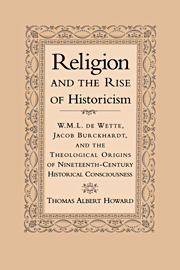 Religion and the Rise of Historicism
Religion and the Rise of Historicism Book contents
- Frontmatter
- Contents
- Acknowledgments
- Introduction: History, Theology, and Modernity
- 1 W. M. L. de Wette: Enlightenment, Romanticism, and Biblical Criticism
- 2 De Wette and Schleiermacher at Berlin (1810–1819): Politics, History, and the Post-Enlightment Transformation of Theology
- 3 De Wette, D. F. Strauss, and the New Christusbild
- 4 Basel, Burckhardt, and de Wette
- 5 History without Centaurs
- Abbreviations: Used in Notes and Bibliography
- Notes
- Bibliography
- Index
3 - De Wette, D. F. Strauss, and the New Christusbild
Published online by Cambridge University Press: 02 December 2009
- Frontmatter
- Contents
- Acknowledgments
- Introduction: History, Theology, and Modernity
- 1 W. M. L. de Wette: Enlightenment, Romanticism, and Biblical Criticism
- 2 De Wette and Schleiermacher at Berlin (1810–1819): Politics, History, and the Post-Enlightment Transformation of Theology
- 3 De Wette, D. F. Strauss, and the New Christusbild
- 4 Basel, Burckhardt, and de Wette
- 5 History without Centaurs
- Abbreviations: Used in Notes and Bibliography
- Notes
- Bibliography
- Index
Summary
The greatest achievement of German theology is the critical investigation of the life of Jesus. What it has accomplished here has laid down the conditions and determined the course of the religious thinking of the future.
– Albert Schweitzer, Geschichte der Leben-Jesu-ForschungHistory is an abyss in which Christianity has been catapulted quite against its will.
– Franz Overbeck, Christentum und KulturThe controversy following the publication of David Friedrich Strauss's Das Leben Jesu (1835) has come to signify the beginning of a radical new phase of theological modernity. This “inspired book,” as Strauss once called it, had much influence on the Left Hegelians, and through them on Karl Marx. Yet despite its perceived novelty, the ideas it embodied were far from new; Strauss's path was prepared by many late Aufklärung biblical scholars whose critical endeavors challenged the supremacy of traditional literal and figural readings of the Bible characteristic of Protestant scholarship since the Reformation. As is well known, the Enlightenment among German intellectuals was not predominantly an antireligious or anti-Christian phenomenon. On the contrary, Aufkädrung thinkers earnestly desired to reformulate Christian doctrine and biblical hermeneutical principles to give Christianity a more secure rational basis and assure its survival in the modern world.
In eighteenth-century German theological scholarship, rational truth was held to possess such qualities as necessity, eternity, and universality. For this reason, historically mediated truth was increasingly regarded as a contradiction in terms.
- Type
- Chapter
- Information
- Religion and the Rise of HistoricismW. M. L. de Wette, Jacob Burckhardt, and the Theological Origins of Nineteenth-Century Historical Consciousness, pp. 78 - 109Publisher: Cambridge University PressPrint publication year: 1999


